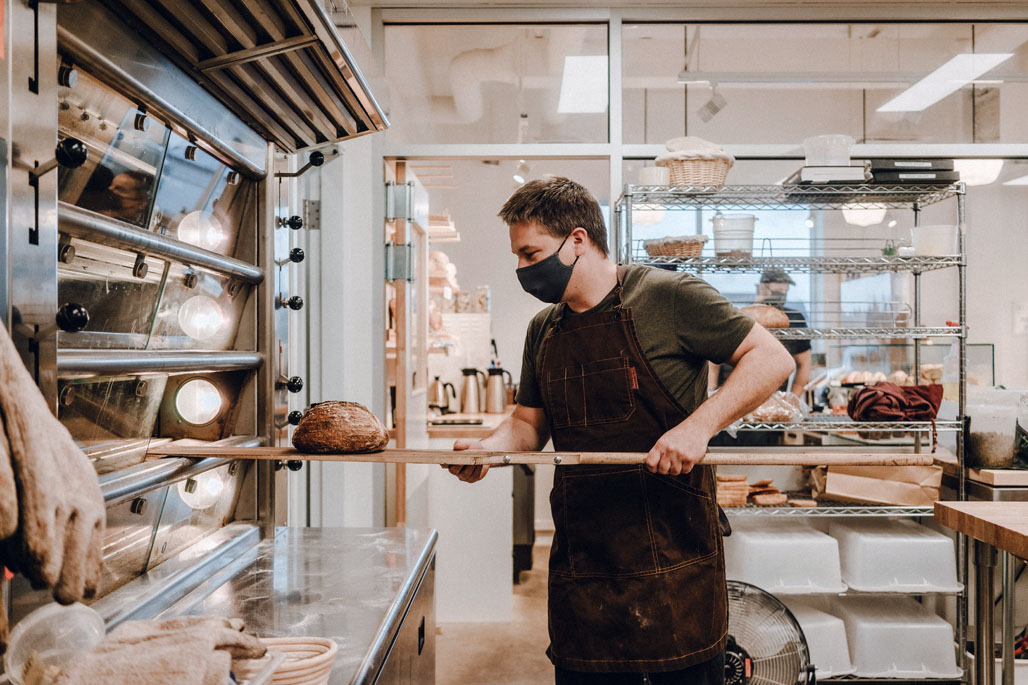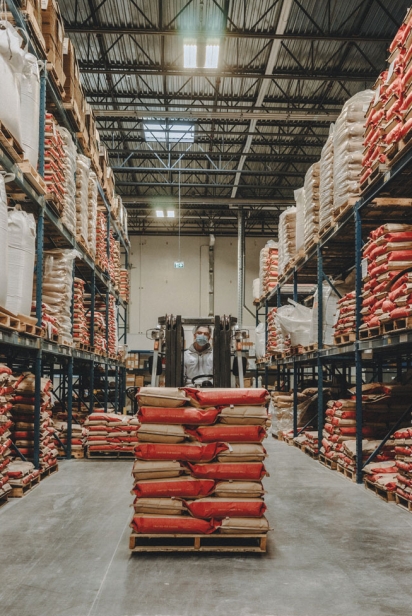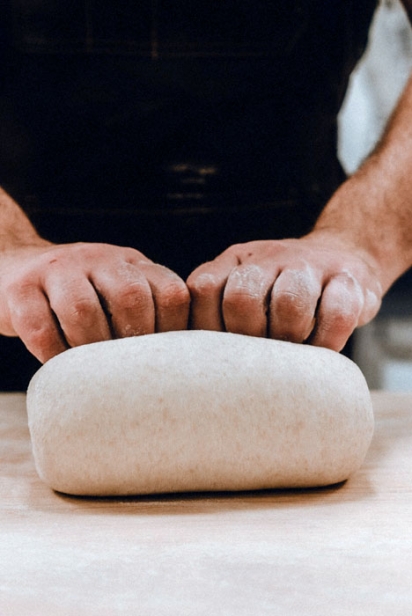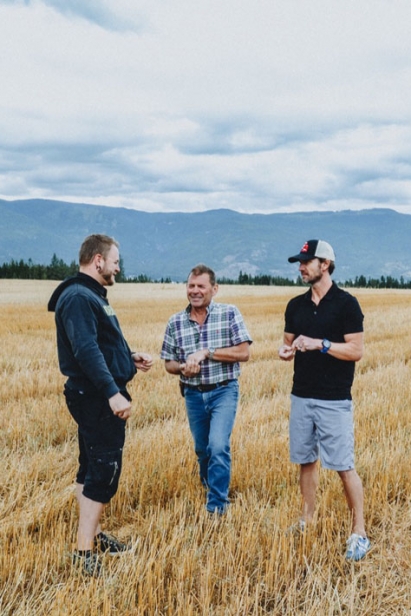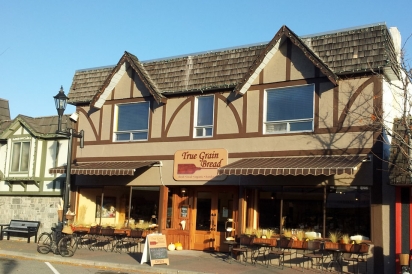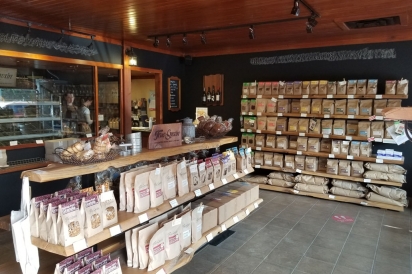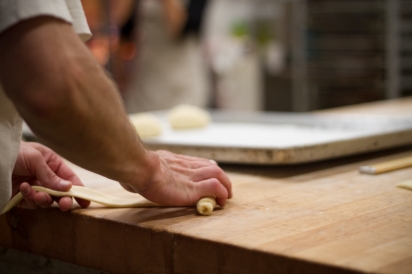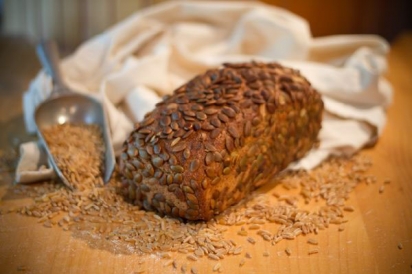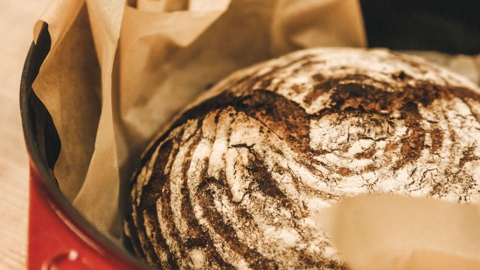A Miller's Tale
If you’ve caught the bread-baking bug, you’re not alone. According to the trend-watchers, the pandemic unleashed a bread-baking frenzy — flour mills couldn’t keep up and would-be bakers often found supermarket shelves bare.
But it’s giving consumers time to think a little more about where their food — and their flour — is coming from, opening the door to local millers to fill the grain gap and offer an education in the wonders of freshly milled flour.
British Columbians are lucky to have some milling pioneers among them, whether it’s Anita’s Flour Mill, True Grain or Flourist, the latter, the latest in the local milling game. All three specialize in freshly milled flour, often starting with local, organic grains, and offer a range of heritage and even ancient- grain flours for bakers to try.
Beyond the iconic red fife, the genetic ground zero of Canadian wheat, there’s large-kernelled khorasan (also known as Kamut®), an early ancestor of durum wheat; rye; and spelt, a nutty, high-protein cereal that traces its lineage to emmer and wild oat grass. Emmer, also called farro, is modern wheat’s Italian ancestor and considered a “foundational” grain, tracing its lineage back 8,000 years.
Einkorn, the oldest and most primitive wheat on Earth, is renowned for its digestibility among gluten-intolerant individuals, and for its high levels of lutein and Vitamin A.
All are predecessors of today’s modern, hybridized wheat, which has been developed for industrial production, high yields and high protein (gluten) for commercial bakeries, prized for consistency over flavour. But heritage grains are gaining ground.
According to research from the NPD Group, which studies market trends, grains eaten by ancient civilizations — including quinoa, sorghum and teff — have seen annual growth approaching 20 per cent in food service in recent years.
So whether it’s interest in health and nutrition, concerns about gluten in modern wheat, or simply a switch to fresh, locally sourced foods, ancient grains deserve a place in your pantry.
Canada’s grain heritage
In the world of flour, wheat is king in Canada. Over the last 70 years, we’ve modified and hybridized wheat for large-scale production, and the ancient and heritage grains supply has been small. But more farmers are planting ancient grains, especially in B.C. where small farms are the rule rather than the exception.
Red fife wheat is the Cinderella story of Canadian heritage grain, literally yanked from the brink of extinction by devoted farmers and bakers. In 1986, pioneer seed conservationist Sharon Rempel rescued a handful of red fife seed grain and planted it as part of her Living Museum of Wheat at the historic Grist Mill in Keremeos, B.C. That led to a revival of red fife, which was adopted by the Slow Food movement and added to the international Ark of Taste, a catalogue of endangered heritage foods around the globe.
While whole grains have stayed on the menu in other parts of the world — think Italian farro, Middle Eastern freekeh and sweet Ukrainian kutia — they are relatively new to Canadian tables. But red fife became the gateway to our interest in heritage and ancestral grains.
In B.C., we now have boutique flour mills, chefs and bakers milling fresh flours and Fieldstone Organics in Vernon, a grain-handling facility dedicated to cleaning and storing these specialty crops.
Chef Eduardo Jordan’s Seattle-based Lucinda Grain Bar (currently closed) specializes in ancient grains, served in grain bowls, house-made crackers and even ice cream, the latter infused with einkorn wheat.
Flour is milled in-house at Lucinda, and milling is also a daily affair in several B.C. artisanal bakeries, including Victoria’s Fol Epi, WildFire Organic Bakery, Fry’s Red Wheat Bread Bakery, Vancouver’s Bad Dog Bread and Flourist.
The Liberty Distillery in Vancouver makes its Trust Ancient Grains Whiskey with a blend of organic spelt, emmer, khorasan and “with a small addition of barley.” And DEVINE Distillery & Winery distills its barrel-aged Ancient Grains spirit, dubbed an “alternative whisky,” starting with B.C. barley, spelt, emmer, khorasan and einkorn.
Ancient grains are in the rotation at Beyond Bread and Terra Breads in Vancouver, too. They use Anita’s flours in their artisan loaves, while In-Grain Pastificio has spelt and farro pasta on the menu, and sells bags of slow-dried traditional pasta to cook at home. Even the popular Vancouver-based White Spot chain serves a farro “power salad” for lunch.
Modern millers
Anita’s Organic Mill in Chilliwack is a pioneer when it comes to stone-milling organic ancient grains in B.C.
“People are taking more time to educate themselves about this basic food ingredient,” says Jayda Smith, Anita’s general manager, noting sales have increased by 50 per cent this year. “A lot of time is now spent around baking at home — it’s pretty neat to see that coming back.”
Anita’s produces 26 different organic flours, ranging from whole grain and sprouted ancient grain flours to blended flours and pancake mixes, sold directly to consumers and supplied to bakeries, pizzerias and supermarkets.
Last year, the company consolidated its operations into a new 34,000 square-foot facility, with grain milling, sprouting, packaging and warehousing under one roof. There’s also Anita’s Bread & Coffee, a new bakery-café to serve the local community fresh whole-grain breads and pastries.
“Our baker is developing new recipes to highlight our incredible variety of organic grains,” says president Taylor Gemmel. “We’re also planning to open an education centre with classes for both professional and aspiring home bakers, to teach them more about using our flours.”
It’s an important goal as baking with these whole-grain flours can be tricky, even for experienced bakers. Education is key to growing this niche market, Smith says, adding that Anita’s website and Facebook Bake Club are connecting a new generation of bakers with whole-grain recipes and tips.
Anita’s flours are now available in supermarkets across Canada, direct from the company online or at the Local Harvest Market in Chilliwack, which carries its entire line of organic baking products and bakes its own wood-fired pizzas and breads using Anita’s ingredients.
Growth has been exponential this year at True Grain, too.
With bakeries in Summerland and Cowichan Bay, True Grain is a pioneer in small-scale milling of whole, organic, B.C.-grown grain, supplying bread, flour and grain to consumers.
It began in 2004 with one small stone mill, still on display inside its bakery on Vancouver Island. Today, the company has expanded to a larger facility, milling a variety of whole grains, certified organic flours for its own bakeries, direct retail sales and wholesale sales to bakers and retailers.
“We’ll mill about 3,000 tonnes of grain this year and every speck of flour in True Grain bread — or pastry or cookies — comes from a B.C. farm,” says president Bruce Stewart.
Stewart is committed to buying organic grain from local growers. It’s an effort to minimize the company’s greenhouse gas emissions and shine a light on the social and environmental cost of imported food, he says.
“More and more people are mindful of where their food comes from and, if we do it right, knowing where your flours and grains come from will be ‘a thing,’ too,” Stewart says. “I hope that is the legacy of True Grain.”
Stewart is also hoping to educate consumers about large-scale wheat and flour production in Canada, and what he says may be driving wheat intolerance issues for consumers.
Our everyday white flour is a highly processed product — stripped of both its germ and bran (the bits that can go rancid), sometimes bleached with chemicals, bulked up with maturing and dough-conditioning agents, and always “enriched” with the nutrients removed in manufacturing.
“We need to understand Article 13 of the Canadian food (labelling) laws, regarding what is added to wheat,” Stewart says, noting regulations state that flour can contain a dozen chemical additives, from chlorine and benzoyl peroxide to bonemeal and l-cysteine derived from human hair and chicken feathers, without any indication on the label.
Furthermore, most non-organic, conventional wheat grown in Canada is sprayed with Roundup (glyphosate), just before harvest to desiccate the plants for easier cutting and combining. It is the most widely sold herbicide in Canada and deemed a “probable carcinogen” by the World Health Organization.
Some experts point to these additives and chemicals as the source of apparent wheat allergies, and why many people find ancient and organic grains easier to eat.
“To this day, I have never met anyone who can’t tolerate einkorn,” Stewart says. “Some people come and buy 30 loaves at a time.”
Todd Laidlaw, a True Grain co-owner and operator of the Summerland bakery, says most grain is sourced from farms around Armstrong and Enderby through Fieldstone Organics, and they still use Osttiroler stone mills from Austria to mill the flour in small batches to preserve flavour and nutrients.
Consumers love the unique texture and flavour of breads and pasta made with their organic spelt, rye, emmer, red fife and einkorn flour, he adds. “Red fife has a natural nuttiness and has always been popular, but some people flock to spelt, which has a lot more earthiness,” says Laidlaw. “When you have a whole grain in pasta or a loaf of bread, you are really going to taste the grain.”
True Grain works with Cowichan Pasta Co. to create artisanal dried pasta, including B.C. Durum, Emmer and Khorasan Fettucine, Khorasan Campanelle and chunky Spelt Creste di Gallo, dark, nutty, high in fibre and often tolerated by those who are sensitive to modern wheat.
From seed to table
Like single-origin chocolate or coffee beans to grind at home, selecting unique grains adds interest to cooking and baking.
Dan Jason, owner of the mail-order seed company Salt Spring Seeds and author of Awesome Ancient Grains & Seeds, writes that heritage and ancient grains are the next frontier in our food explorations, each with its own character and provenance. Whether it’s Blue Tinge Ethiopian Emmer or Black Einkorn, grains can be planted on small plots and in many regions beyond the traditional Canadian wheat belt.
“If you’re seriously thinking about growing more of your own food, nothing can be easier or more rewarding than grains,” he writes. “They grow like the grass of your lawn — only you allow them to mature instead of mowing them down.
“Easy to grow and delectable to eat, these ancient seeds and grains are the nutritional powerhouses that sustained civilizations for
It began in 2004 with one small stone mill, still on display inside its bakery on Vancouver Island. Today, the company has expanded to a larger facility, milling a variety of whole grains, certified organic flours for its own bakeries, direct retail sales and wholesale sales to bakers and retailers.
“We’ll mill about 3,000 tonnes of grain this year and every speck of flour in True Grain bread — or pastry or cookies — comes from a B.C. farm,” says president Bruce Stewart.
Stewart is committed to buying organic grain from local growers. It’s an effort to minimize the company’s greenhouse gas emissions and shine a light on the social and environmental cost of imported food, he says.
“More and more people are mindful of where their food comes from and, if we do it right, knowing where your flours and grains come from will be ‘a thing,’ too,” Stewart says. “I hope that is the legacy of True Grain.”
Stewart is also hoping to educate consumers about large-scale wheat and flour production in Canada, and what he says may be driving wheat intolerance issues for consumers.
Our everyday white flour is a highly processed product — stripped of both its germ and bran (the bits that can go rancid), sometimes bleached with chemicals, bulked up with maturing and dough-conditioning agents, and always “enriched” with the nutrients removed in manufacturing.
“We need to understand Article 13 of the Canadian food (labelling) laws, regarding what is added to wheat,” Stewart says,
noting regulations state that flour can contain a dozen chemical additives, from chlorine and benzoyl peroxide to bonemeal and l-cysteine derived from human hair and chicken feathers, without any indication on the label.
Furthermore, most non-organic, conventional wheat grown in Canada is sprayed with Roundup (glyphosate), just before harvest to desiccate the plants for easier cutting and combining. It is the most widely sold herbicide in Canada and deemed a “probable carcinogen” by the World Health Organization.
Some experts point to these additives and chemicals as the source of apparent wheat allergies, and why many people find ancient and organic grains easier to eat.
“To this day, I have never met anyone who can’t tolerate einkorn,” Stewart says. “Some people come and buy 30 loaves at a time.”
Todd Laidlaw, a True Grain co-owner and operator of the Summerland bakery, says most grain is sourced from farms around Armstrong and Enderby through Fieldstone Organics, and they still use Osttiroler stone mills from Austria to mill the flour in small batches to preserve flavour and nutrients.
Consumers love the unique texture and flavour of breads and pasta made with their organic spelt, rye, emmer, red fife and einkorn flour, he adds. “Red fife has a natural nuttiness and has always been popular, but some people flock to spelt, which has a lot more earthiness,” says Laidlaw. “When you have a whole grain in pasta or a loaf of bread, you are really going to taste the grain.”
True Grain works with Cowichan Pasta Co. to create artisanal dried pasta, including B.C. Durum, Emmer and Khorasan Fettucine, Khorasan Campanelle and chunky Spelt Creste di Gallo, dark, nutty, high in fibre and often tolerated by those who are sensitive to modern wheat.
From seed to table
Like single-origin chocolate or coffee beans to grind at home, selecting unique grains adds interest to cooking and baking.
Dan Jason, owner of the mail-order seed company Salt Spring Seeds and author of Awesome Ancient Grains & Seeds, writes that heritage and ancient grains are the next frontier in our food explorations, each with its own character and provenance. Whether it’s Blue Tinge Ethiopian Emmer or Black Einkorn, grains can be planted on small plots and in many regions beyond the traditional Canadian wheat belt.
“If you’re seriously thinking about growing more of your own food, nothing can be easier or more rewarding than grains,” he writes. “They grow like the grass of your lawn — only you allow them to mature instead of mowing them down.
“Easy to grow and delectable to eat, these ancient seeds and grains are the nutritional powerhouses that sustained civilizations for thousands of years,” Jason continues. “If you don’t mill them or pearl them or roll them, but just cook them, you get all of their goodness.”
Whole, presoaked wheat berries should be simmered in plenty of water or stock until tender (about two hours), or can be cooked from a dry state in a pressure cooker in just 30 minutes. Once cooked, whole grains can be portioned and frozen for convenience.
Jason also recommends sprouted grains, simply soaking kernels overnight then rinsing for two or three days until sprouted for “a raw food with a soft yet crunchy texture and a rich sweet taste.”
Along with various ancient grain flours, Anita’s, True Grain and Flourist sell whole kernel grain to cook for pilafs, risotto and salads or to mill at home. You can also buy whole organic grain direct from Fieldstone Organics in Armstrong and learn more about specific ancient grains from its website, including how to cook, sprout and mill them. Fieldstone Organics also has an impressive selection of small mills and flakers for use in home or commercial kitchens.
Your daily bread
Bread, as they say, is “the staff of life.” It’s a nourishing, comforting food that’s eaten every day, in every corner of the world.
As more people stay close to home, it’s likely they will experiment with baking bread, honing their baking skills and including new flours and ancient grains in the mix. Surveys indicate most home bakers plan to continue their bread-baking adventures, even after life gets back to “normal.”
Baking bread isn’t just practical, it’s fun and empowering to know you can create this staple at home.
Good bread requires just a few ingredients and a little time — but next time you bake, consider the grain and the miller who turned your primary ingredient into tasty, freshly milled flour.
Anita’s Organic Mill Store
7697 Lickman Rd., Chilliwack, B.C.
anitasorganic.com | 604.823.5547 | @anitasorganic
True Grain
10108 Main St., Summerland, B.C. | 250.494.4244
1725 Cowichan Bay Rd., Cowichan, B.C. | 250.746.7664
truegrain.ca | @truegrainbread
Salt Spring Seeds
250 Toynbee Rd., Salt Spring Island, B.C.
saltspringseeds.com | 250.537.5269 | @saltspringseeds


